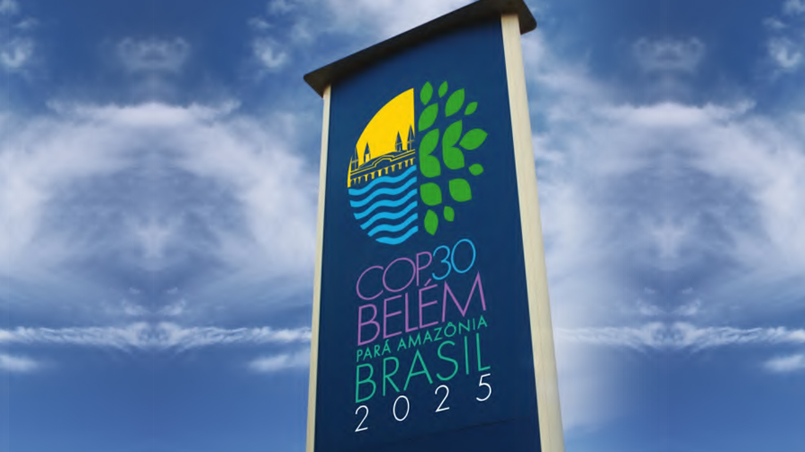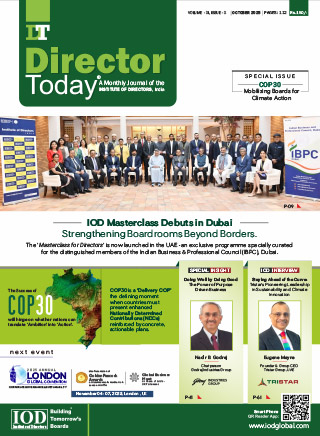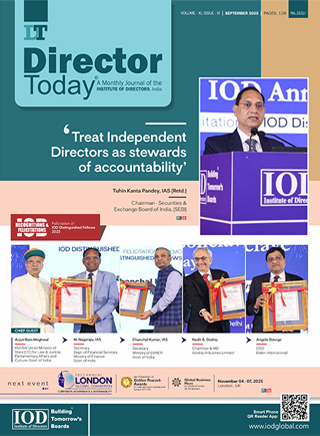A Report on 2023 - 18th International Conference on CSR

The Institute of Directors (IOD), India organised the 18th International Conference on Corporate Social Responsibility in Mumbai, India on December 21-22, 2023 on the theme 'CSR and Exploring Evolution of ESG in the New World Economy'. The venue of the Convention was Hotel Taj Lands End, Mumbai (India). More than 400 business professionals comprising Industry and Business leaders, Board members, Directors, policy makers, educationists, private as well as public sector institutions participated. It also had participation by senior officials from the Government of Maharashtra, as well as delegates from foreign countries. The famed Golden Peacock Awards instituted by the Institute of Directors for Corporate Social Responsibility (National and Global), 'HR Excellence' and 'Innovation Management' – 2023 were also presented to the winners amongst the industry leaders.
The conference extensively debated and discussed into the multifaceted global risks and existential threats that corporations face, emphasizing the pivotal role of corporate boards in addressing these challenges with profound societal implications. A significant focus of discussion was on Corporate Social Responsibility (CSR) and the evolution of Environmental, Social, and Governance (ESG) practices today in the world economy. Discussions revolved around strategic boardroom approaches to effectively and timely achieve relevant Sustainable Development Goals (SDGs) through the implementation of impactful CSR initiatives. The imperative of CSR in corporate boardrooms was repeatedly underscored, emphasising its strategic significance. The conference signalled the role of public and private enterprises in fostering positive community relationships. The Board's pivotal role in shaping ESG strategies and fostering sustainability through CSR was the central theme. Going beyond mere profit considerations, there was a collective call to embrace CSR as an essential element for ensuring better compliance and positive outcomes, besides generating market goodwill and preferred customer response.

Distinguished guests during the lighting of the lamp ceremony (L to R) Mr. Ovais Sarmad, Dr. Anju Sharma IAS, Mr. Vijay Karia, Mr. Sitaram Kunte IAS (Retd.), Mr. Sailesh IAS, Lt. Gen. Surinder Nath, PVSM, AVSM (Retd.), Hon'ble Justice Devendra Kumar Upadhyaya, Mr. Desh Deepak Verma IAS (Retd.), Mr. Atul Temurnikar, Dr. Niranjan Hiranandani and Mr. Manoj K. Raut.
DAY 1
PLENARY SESSION I – INAUGURAL SESSION
The convention was inaugurated with the traditional 'Lighting of the Lamp' ceremony by special guests. The 'Welcome Remarks' were delivered by Mr. Desh Deepak Verma, IAS (Retd.), Principal Advisor - Govt. Relations, Institute of Directors, former Secretary General, Rajya Sabha.

The 'Chief Guest Address' was delivered by:
Hon'ble Justice Devendra Kumar Upadhyaya
Chief Justice - High Court of Bombay
Justice Upadhyaya extended a warm welcome to all the delegates and outlined an introduction to the Convention's Theme. He emphasized the inevitability of change and the consequential impacts that ensue. Highlighting the pivotal role of CSR in fostering economic growth and development, he underscored the accountability of boards of directors for all organisational decisions and services. He emphasized the mandated CSR obligation of allocating 2% of net profits and expounded on CSR's philosophy, emphasising ethical conduct, transparency, accountability, and respect for human rights. Drawing connections, he pointed out that ESG factors are intertwined with CSR principles. Investing in CSR, he noted, not only enhances goodwill but also presents lucrative opportunities for businesses. He highlighted issues such as pollution, global warming, and greenhouse effects, emphasizing their widespread impact and stressing the need to transition from fossil fuels to renewables.
This was followed by the release of the Conference Souvenir by the Chief Guest, Hon'ble Justice Devendra Kumar Upadhyaya as well as other dignitaries including Dr. Niranjan Hiranandani, Dr. Anju Sharma IAS, Lt. Gen. Surinder Nath PVSM AVSM (Retd.), Mr. Sailesh IAS, Mr. Rajiv Jalota IAS, Mr. Atul Temurnikar and Mr. Vijay Karia.
The 'Welcome Address' was delivered by:
Mr. Sitaram Kunte, IAS (Retd.)
Chairman – Western Region, Institute of Directors
former Chief Secretary, Maharashtra
Mr. Kunte extended a warm welcome to all the guests and delegates on behalf of IOD. In his informed address, he reflected on a transformative journey where businesses are shifting their perspective, from a profit-driven approach to one centred on inclusion and impact. He highlighted the role of CSR compliance in providing a platform for inclusive growth, emphasising the need for boards to go beyond conventional parameters and focus on sustainable practices that positively impact the ecosystem. He stressed the importance of boards being well equipped and adopting innovative practices and shared noteworthy insights about his state's substantial investment, noting that 4,200 companies in the state had already allocated Rs. 52,000 crores for CSR activities across 36 districts and 10 sectors.
This was followed by the 'President's Address' delivered by:
Lt. Gen. Surinder Nath, PVSM AVSM (Retd.)
President, Institute of Directors
former Vice Chief of Army Staff and Chairman, UPSC
Lt. Gen. Nath underscored CSR as a pivotal medium for comprehending the challenges faced by deprived and underprivileged population. Stressing the significance of collaborative efforts between the government & corporations, he highlighted CSR's role in strategic planning, rural development, and human empowerment, contributing to the overall enrichment of the society. He stated that Maharashtra is the biggest contributor to CSR. Corporate consciousness and investment in local communities establish trust between the parties involved. Boards need to proactively channel CSR funds into areas with minimal industrial presence, particularly in the north-eastern States. He emphasised the importance of integration with government initiatives and the active involvement of stakeholders and other entities in the over-all value chain. Focus areas, including community engagement, product innovations, stakeholders' activism, human-centric approaches, and environmental protection, were underscored as key elements. The session concluded with a general reminder that individual responsibility holds as much or equal importance as corporate responsibility in fostering positive social change.
The 'Keynote Address' was delivered by:
Dr. Niranjan Hiranandani
Co-Founder and Managing Director
Hiranandani Group
Dr. Hiranandani congratulated IOD for creating a program that is not just unique but beautiful and necessary for the entire country. He emphasized the impact of environmental changes in India and underscored the role of ESG in addressing these issues. He said, “The time has now arrived when CSR is a crucial component of the corporate ecosystem.” He added that businesses and enterprises can also become leaders by setting an example for the government as well as individuals to act in Environmental, Social and Governance areas. Even the smallest amount of effort can foster a successful ESG dynamic. Quoting Mahatma Gandhi, he said, "The best way to find yourself is to lose yourself in the service of others." Furthermore, he appreciated IOD for organising such a significant conference as this.
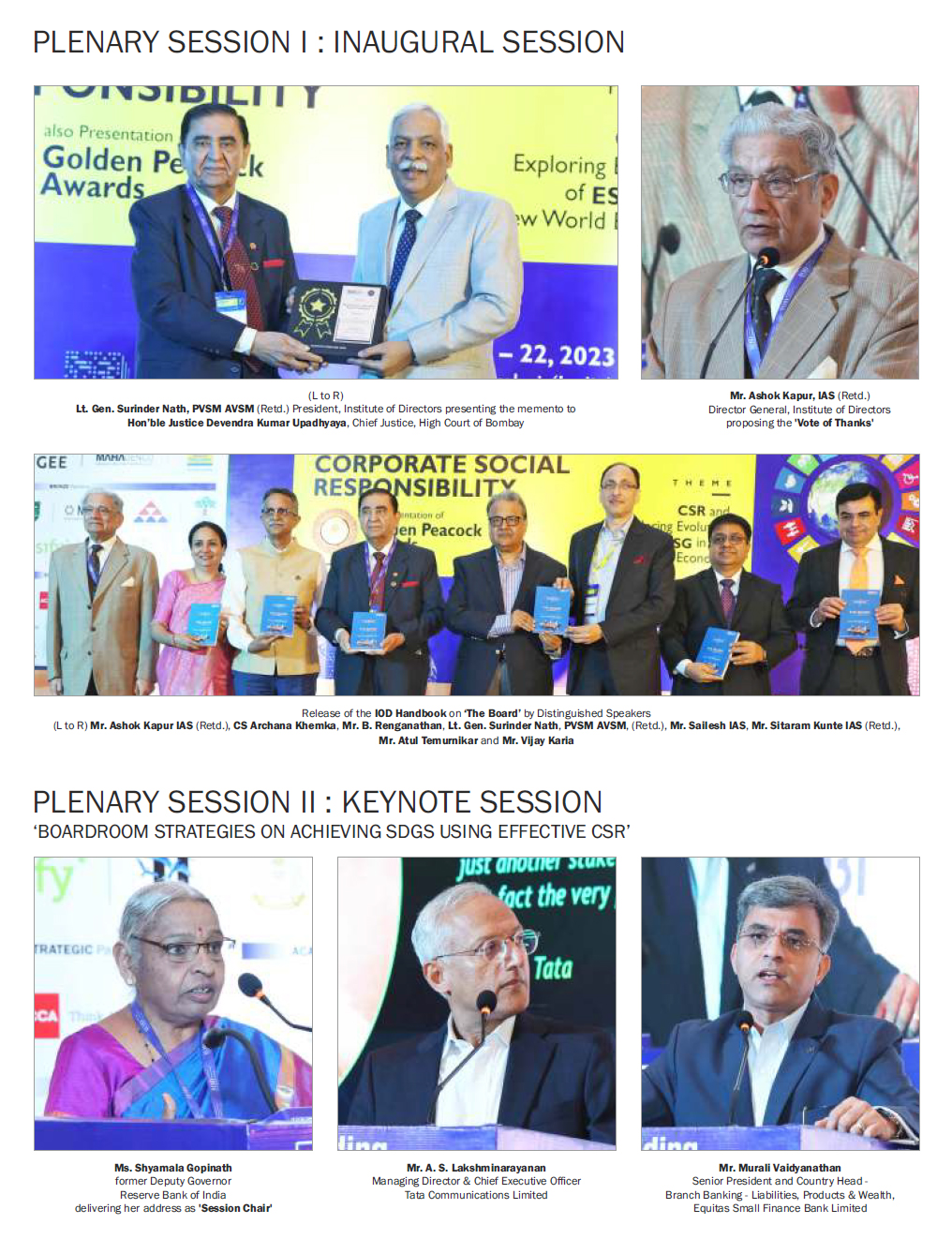
This was followed by the 'Special Address' delivered by:
(1.) Mr. Atul Temurnikar
Chairman & Co-Founder - Global Schools Foundation, Singapore
(2.) Mr. Vijay Karia
Chairman & Managing Director - Ravin Group of Companies, India
(3.) Dr. Anju Sharma IAS
Additional Chief Secretary - Labour, Skill Development & Employment Department, Government of Gujarat
Mr. Temurnikar spoke about the positive impact of effective CSR on fostering interculturalism. Emphasizing the significant role of the 'alpha generation', he underscored its crucial contribution to India's ascent to becoming the world's third largest economy. He said, “Investors, regulators, customers, and stakeholders are placing significant emphasis on integrating ESG principles into their strategic decision-making processes. He focused on the three elements driving India's growth:
(1.) India's commitment to 'net zero' by 2070.
(2.) Mandate to sustainable recordings and business practices.
(3.) United Nations 17 SDGs becoming the parameter in analysing companies' capabilities in attracting customers as well as capital.
He said that the concept of Sustainable Interculturalism will play a pivotal role in shaping the future of engaging CSR and ESG practices. He said that promoting interculturalism is crucial for breaking down national boundaries and fostering stronger global connections. Companies must prioritize embracing the diversity of foreign cultures to build robust relationships between businesses, individuals, and nations. Globally, India has emerged as a reliable partner in trade and international relations. For clean growth, 'sustainability and an ethical economy', interculturalism will play a key role in the future. Evolution in business environment has led to the conversion of measuring success not just relying on financial reports but also to evaluate the broader impact a company is actively creating.
Mr. Karia spoke about the shift from CSR to ESG considerations. He said that individuals find themselves in a position of inherent responsibility through birth, inheritance, or external imposition. Maintaining a delicate balance is crucial, as even a small misstep can lead to undesirable consequences. The degree of transparency in a company is influenced by its business practices. Individual mindsets and procedures play a crucial role in shaping the overall attitude and processes of the company. He said that achieving a sustainable future requires inclusivity, where everyone contributes positively. He added that it is crucial to adopt a mindset of a giver and not a taker.
Dr. Sharma shared that in India, a CSR revolution is underway, resulting in a doubling of CSR numbers annually, marking 46,000 crore and above in 2021-22. Notably, 70% of CSR expenditure is focused on education, health, and the environment, demonstrating the highest return on investment. There is a pressing need for organisations to prioritize investments in skill development. For companies engaged in CSR, directing resources towards skill development is imperative; given the rapid technological advancements shaping the future. It has been recorded that Rs. 710 crores has been invested in skill development training and institutes. Governments and companies need to spend CSR funds on skill development programmes according to their area of specialisation in industry. He added that Big Data, IOT, Analytics etc. will propel the new revolution soon!
The 'Guest of Honour Address' was delivered by:
Mr. Sailesh IAS
Member, Public Enterprises Selection Board (PESB)
former Secretary, Dept. of Public Enterprises
Ministry of Heavy Industries & Public Enterprises, Government of India
Mr. Sailesh mentioned that the Indian government has a big mandate for moulding businesses into wealth creation but they need to be dependent on their resources without bringing in government equity. He said that currently, corporations are not just doing what is mandated in the Indian Companies Act, 2013, but are going beyond. The government has taken the initiative of determining the allocation of government funds based on values, including not only profits but also the broader societal impact. 250 public sector undertakings are operating in 109 districts where industrial development at present is deficient. Emphasising that shareholder value promotes the establishment of a strong brand and fosters trust among the stakeholders and society. Capital expenditure is gradually transformed into a circular growth model, bridging the gap between public and private sectors. The collaborative efforts of public and private entities are crucial for the success of India's overall economic growth.
Mr. Ashok Kapur IAS (Retd.), Director General, Institute of Directors proposed the 'Vote of Thanks'. He highlighted that India is a global pioneer in mandating CSR through law. He further said that IOD studies and research show that CSR is a very useful concept for enhanced reputation and brand management by the organisations. It promotes a healthy culture by fostering loyalty among customers, stakeholders, and suppliers. He also noted that 60% of Listed Companies are voluntarily spending more than the 2% prescribed by law, showcasing CSR as one of the main missions of successful companies in the near future.
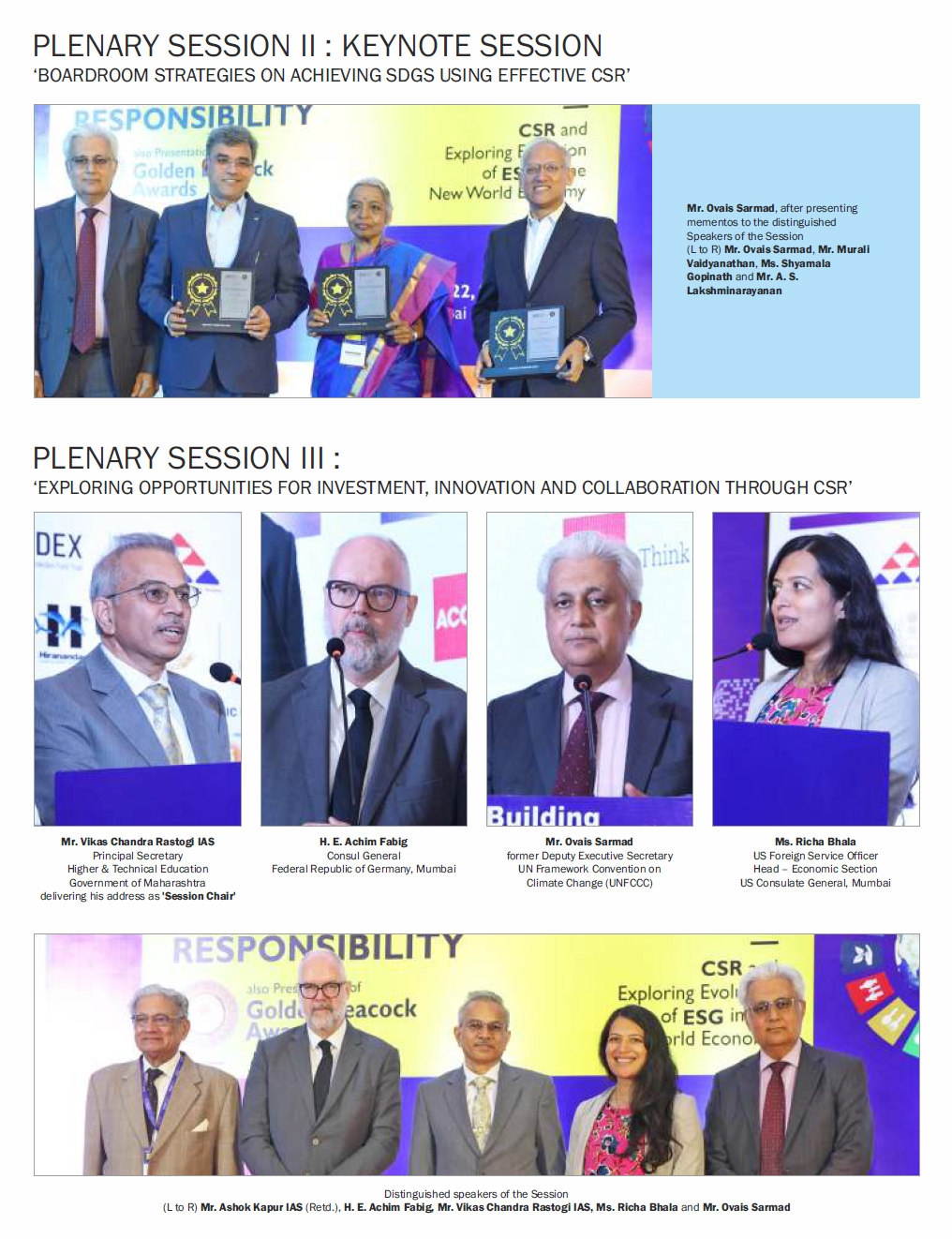
This was followed by the release of the IOD Handbook on 'The Board' by Mr. Sailesh IAS, Mr. Sitaram Kunte IAS (Retd.), Mr. Atul Temurnikar, Mr. Vijay Karia, Mr. Ashok Kapur IAS (Retd.), Lt. Gen. Surinder Nath, PVSM, AVSM (Retd.), CS Archana Khemka and Mr. B. Renganathan (author).
PLENARY SESSION II – KEYNOTE SESSION - Boardroom Strategies on achieving SDGs using Effective CSR
The Session was Chaired by:
Ms. Shyamala Gopinath
former Deputy Governor - Reserve Bank of India
The Session had the following eminent Speakers:
(1.) Mr. A. S. Lakshminarayanan
Managing Director and Chief Executive Officer - Tata Communications Limited
(2.) Mr. Murali Vaidyanathan
Senior President and Country Head – Branch Banking - Liabilities, Products & Wealth, Equitas Small Finance Bank Limited
Ms. Gopinath briefly discussed the 'triple bottom line' approach, which stands for 'Profit', 'People', and 'Planet'. She emphasized the importance of localizing Sustainable Development Goals (SDGs) and highlighted how impact assessment is pivotal in determining whether targets have been achieved or where there has been a short sail. The mandate for a board-level CSR committee has standardized the reporting of CSR activities, making it easier to analyse CSR data and compare it across corporations. She mentioned that Boards need to understand the growing relevance of ESG risks and the strategies adopted by companies to manage these risks and opportunities. She expressed, "I'm really glad that the IOD has brought in this issue of ESG. Having the right ESG strategy is critical for a company to ensure adequate risk mitigation, enhance resilience, investor confidence, and competitive advantage.” According to her, 'Sustainable finance' is a key focus area for global investors and policymakers. She further added, “Mobilisation of finance towards Sustainability objectives can be achieved through various financial products and instruments such as sustainable or 'green bonds', 'green deposits', and ESG funds.” She also laid emphasis on greenwashing, and recommended the adoption of a Sustainable Finance taxonomy, mandating more disclosure norms involving third parties to validate those disclosures. She concluded with the statement, “IOD has provided us with an opportunity to put our minds together and discuss boardroom strategies with regard to SDGs, ESG, and CSR. As business leaders, we carry the responsibility of aligning our businesses with the needs of the environment and society in which they operate.”
Mr. Lakshminarayanan said that boardroom strategies for a net-zero commitment and integrating CSR, Sustainability, and ESG policies for a greener future are critical aspects that will shape our future. He said that 'net-zero' commitment is not just a trend; it's a pledge to ensure that our organisations can thrive in harmony with our planet. He laid emphasis on the need to have an integrated approach towards all stakeholders and added that businesses are carefully being scrutinized now more than ever by investors and other stakeholders for their attitude towards climate change, business model and potential, sustainability efforts and commitment to the local community, and their investments in future generations, Environmental, Social, and Governance, as well as diversity, equity, and inclusion (DEI) policies. He proudly mentioned that Tata Communications has taken the lead and has embedded ESG aspects into their enterprise risk management framework, ensuring long-term resilience, reputation management, and sustainable growth in a continuously evolving business landscape.
Mr. Vaidyanathan shared that soon, E of ESG, which stands for environment, will transform into ecology; S into society, ethics, and legality-driven; and G into regulated, compelled, ethics, diversity, and inclusion. In ESG, UN SDGs are achieved. India is exploding in terms of physical and digital infrastructure, which will lead to being a growth leader. Creating an ecosystem and environment wherever you exist is important. Moreover, at Equitas, S stands for stability, scalability, and sustainability. He also said, 'Skills have two levels: skills for survival and skills for specialization'. He proudly announced that Equitas ploughs back 5% of its profits into CSR activities every quarter. He mentioned the necessity of skill development, 'blue bonds', 'yellow bonds', and 'transition bonds'.
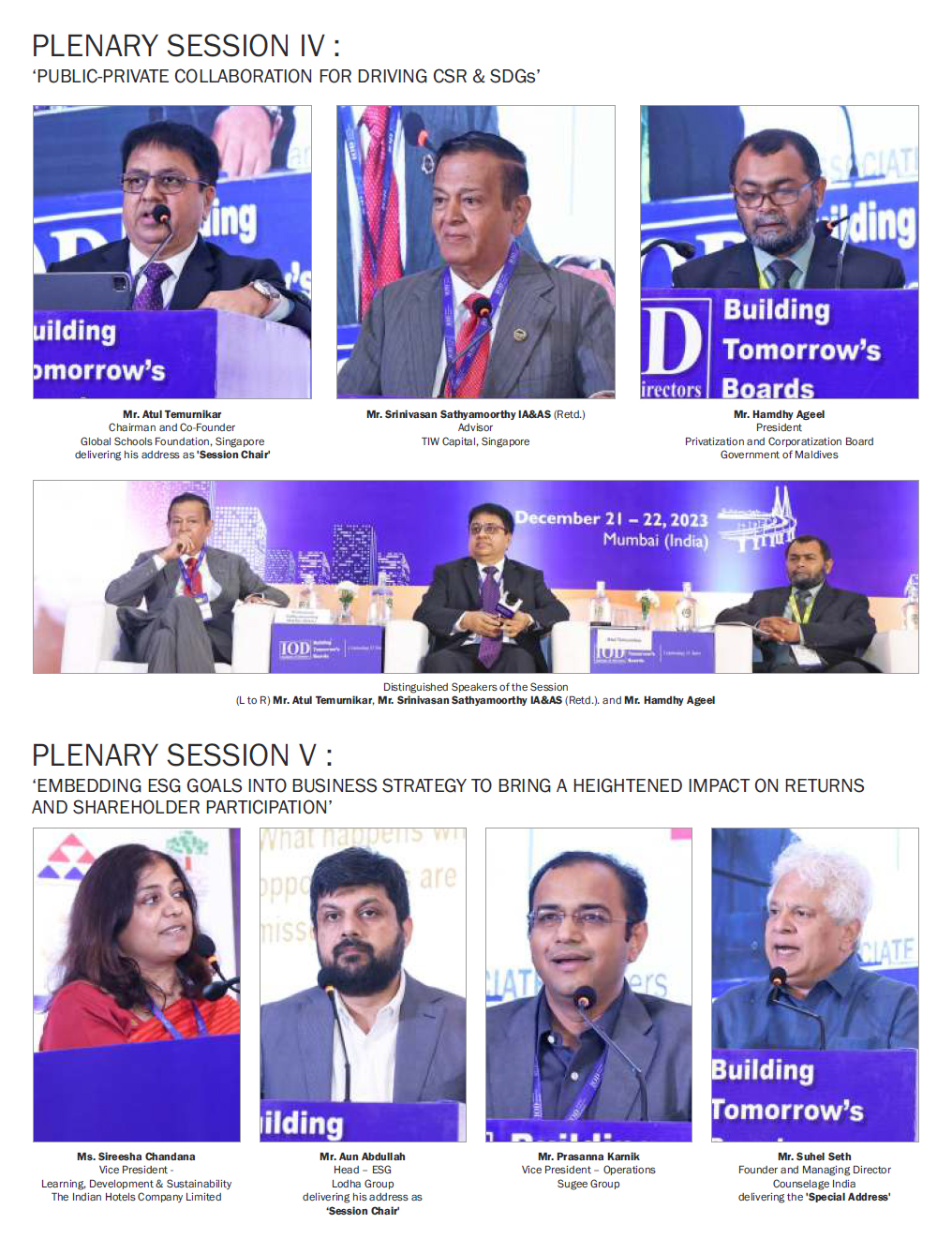
This was followed by a close Q&A Session with the Audience.
PLENARY SESSION III – Exploring Opportunities for Investment, Innovation and Collaboration through CSR
The Session was Chaired by:
Mr. Vikas Chandra Rastogi IAS
Principal Secretary, Higher & Technical Education, Government of Maharashtra
The Session had the following eminent Speakers:
(1.) H.E. Achim Fabig
Consul General of the Federal Republic of Germany, Mumbai
(2.) Mr. Ovais Sarmad
former Deputy Executive Secretary - UN Framework Convention on Climate Change (UNFCCC)
(3.) Ms. Richa Bhala
US Foreign Service Officer, Head – Economics Section
US Consulate General, Mumbai
Mr. Rastogi mentioned the priority areas in CSR such as: education, healthcare, livelihood, and women empowerment, as underlined in the Companies Act, 2013. He particularly focused on education and agriculture, highlighting a gap in integrating life skills, soft skills, and domain skills. He asked corporations to contribute by providing internships or skill based training to make individuals workplace-ready. He added that the entrepreneurship ecosystem can also play a crucial role in India's sustainable growth. The government is investing almost 3% of GDP on education, but it should be 6%, indicating an opportunity for corporations to create skilled employees through collaboration and investments, contributing to a sustainable growth trajectory. In agriculture, corporations can engage directly with farmers by assisting in extension activities, supporting women's cooperatives, and forming self-help groups. These efforts can help farmers become part of a climate-resilient value chain. Various schemes by the Government of India have infused money, and partnerships with corporations have brought more efficiency, focus, and better monitoring to these initiatives.
H.E. Fabig highlighted the global impact of disasters on the economy, emphasizing that the damage caused by climate change is often not covered by insurance companies. Reflecting on the evolution of CSR in Germany, he mentioned that in 2014, German companies, unsure of how to navigate CSR amendments, recognised the need for extensive work in their localities, including factories, plants, workers, villages, schools, hospitals, and various community presence areas. He noted that as we enter the second or third generation of CSR, there is a broader and more forward-looking perspective. He emphasized the commitment of the G20 to the Sustainable Development Goals (SDGs), stating that it will only be meaningful if governments come together to discuss and corporations, as part of their responsibility, also address these goals. He discussed the EU's Carbon Border Adjustment Mechanism (CBAM), a tool designed to establish a fair price on carbon emissions during the production of carbon-intensive goods entering Germany which aims to encourage cleaner industrial production in non-EU countries, initially focusing on certain goods like cement, iron and steel, aluminium, fertilizers, electricity, and hydrogen. He highlighted the significance of disclosure in impacting a company's marked value, emphasising the need for Indian companies to align themselves with global sustainability goals. Engaging with the supply chain and collaborating with German and European companies, he suggested, would require a shift in company mind-set towards diversity, inclusivity, sustainability, and renewable energy.
Mr. Sarmad spoke about the urgency of action required for mitigating climate change. He referred to the Paris Agreement and said that the focus of COP 28 was to keep 1.5˚C within reach, and that all fossil fuels were referenced for the first time in 30 years during COP 28. He discussed the need to transition away from fossil fuels towards greener and more renewable energy sources. In COP 28, there was an agreement to triple the energy capacity, double energy efficiency in all sectors by 2030 and operationalize funds for 'loss and damage' climate impact. He highlighted the urgency for governments, corporations, and individuals to translate these agreements into actions quickly. CSR, he suggested, could also be considered as Corporate Climate Responsibility, given the urgency of the situation. Businesses should be encouraged to reduce carbon emissions throughout the supply chain. CSR activities should involve investing in and promoting the use of renewable energy sources, combating climate change, and supporting the transition to a low-carbon economy. He added that embracing a Circular Economy model is a sustainable CSR approach that minimizes waste by reusing and recycling, contributing to a more sustainable and climate-resilient system.
Ms. Bhala spoke about the U.S. and India collaboration with respect to climate change, science, emerging technologies clean energy, and protecting oceans. 'Seas to Stars' - both India and the U.S. are working together to create solutions for tomorrow towards ensuring prosperity, security, and inclusion; women's empowerment and economic empowerment; and climate change. Low women's participation is seen as a shared challenge, and they aim to create a community of best practices advocating for equal participation and employment of women in the workplace. They are working across sections and agencies, involving India-US MNCs, local NGOs, and Indian media, to boost women's economic empowerment. She further added that when women are economically empowered, they reinvest in families and communities, contributing to India's overall growth. Regarding climate change and the green energy transition, she highlighted the potential for several nuclear collaborations and the importance of everyday innovations in bringing down the cost of energy, shifting towards a better and cleaner economy. The private sector plays a crucial role in building solutions, with best business practices, various technologies, and innovations being the key features.
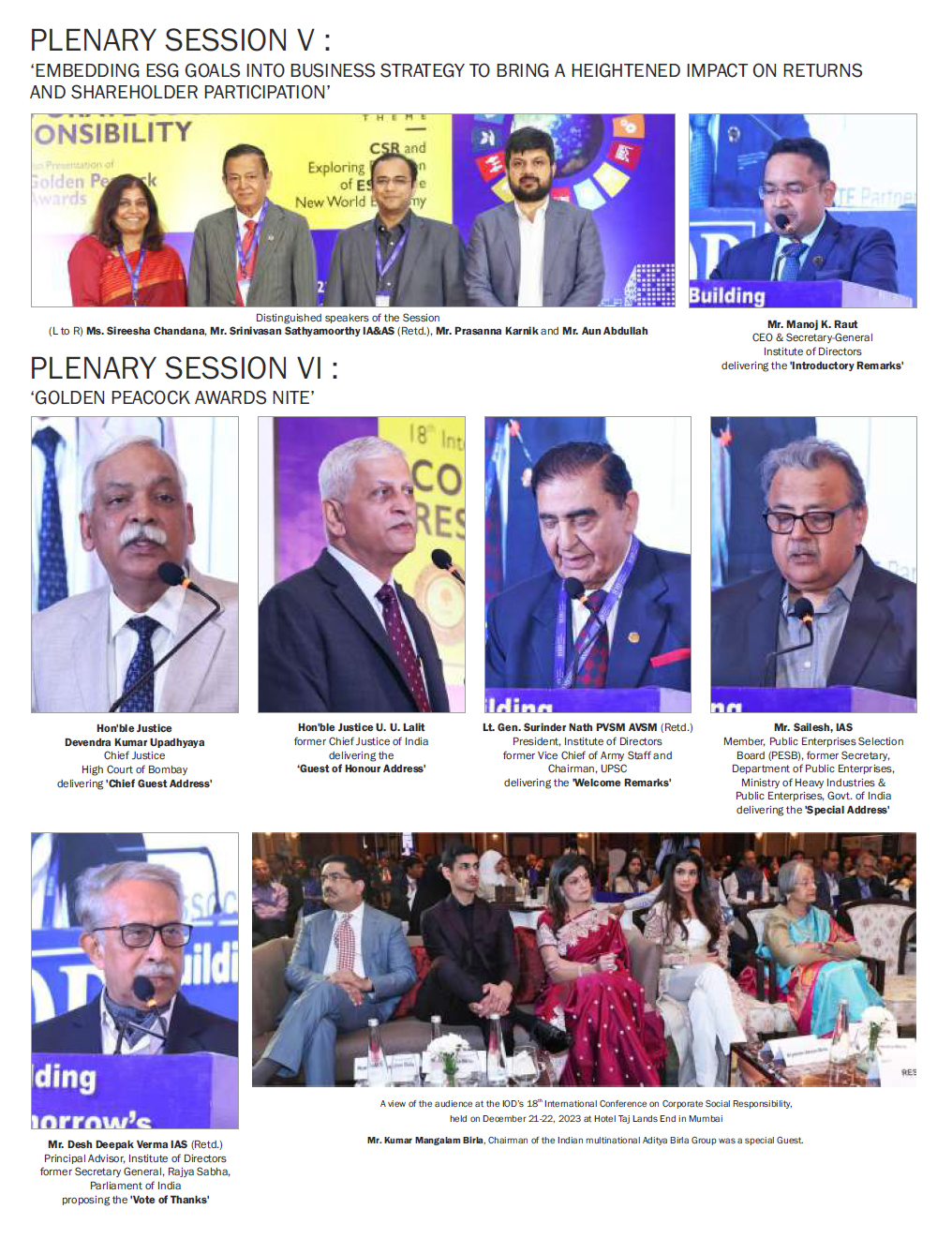
This was followed by an effective interactive Q&A Session with the Audience.
PLENARY SESSION IV – Public-Private Collaboration for driving CSR & SDGs
The Session was Chaired by:
Mr. Atul Temurnikar
Chairman & Co-Founder - Global Schools Foundation, Singapore
The Session had the following eminent speakers:
(1.) Mr. Srinivasan Sathyamoorthy IA & AS (Retd.)
Advisor -TIW Capital, Singapore
(2.) Mr. Hamdhy Ageel
President - Privatization and Corporatization Board, Government of Maldives
Mr. Temurnikar shared his insights on the positive impact of effective CSR on fostering interculturalism. He emphasized that promoting interculturalism is crucial for breaking down national barriers and fostering stronger global connections. Companies must prioritize embracing the diversity of foreign cultures to build robust relationships between businesses, individuals, and nations.
Mr. Sathyamoorthy discussed how public-private partnership agreements have been shaped, reshaped, and evolved. He emphasized that India has embraced 'blended finance' for development, considering it a necessity of the hour. He pointed out that most governments, whether federal or state, have limited funds available for capital expenditure, as a significant portion is allocated to consumer subsidies. As a result, India is reliant on the private sector as partners in progress to propel development forward. Highlighting that every sector in the economy is now open to the private sector, he provided examples from the highways, railways, and hospitality sectors. In these cases, the public sector, which owns substantial land, can collaborate with the private sector to build highways, railway lines, hospitals, etc. He stressed the importance of matching the resources of the government with the agility of the private sector for effective development. He mentioned that India has a significant export market, and there is untapped potential in the food sector for private sector exploitation. He also noted that Artificial Intelligence is covering seeking private sector participation, and this involvement will drive the evolution of the entire healthcare sector. He concluded by stating that CSR is a "top-up for development," underlining its role as an additional contributor to overall development efforts.
Mr. Ageel began by tracing the Sustainable Development Goals (SDGs) at their inception in 2015, a collaborative effort involving 195 countries under the United Nations. He highlighted the significance of over 150 global leaders crafting the 'Agenda 2030' for sustainable development, representing a universal commitment to improving humanity and the planet. He highlighted that with the participation of the private sector in CSR activities, global poverty had seen a decline. He highlighted the significance of the era of liberalization, privatization, and globalization which has elevated Public-Private collaborations. He said that the partnership between the public and private sectors is indispensable in achieving these goals. He stressed the need to forge diverse and rigorous partnerships that bridge funding gaps, urging governments to identify viable Public- Private Partnership (PPP) projects. This involves structuring contracts for fair pricing, risk transfer, and establishing comprehensive accountancy standards for PPP. In conclusion, Mr. Ageel highlighted that through CSR in public and private sector collaboration, SDGs offer an opportunity to unify, galvanize, and expand efforts to improve the lives of the entire global community.
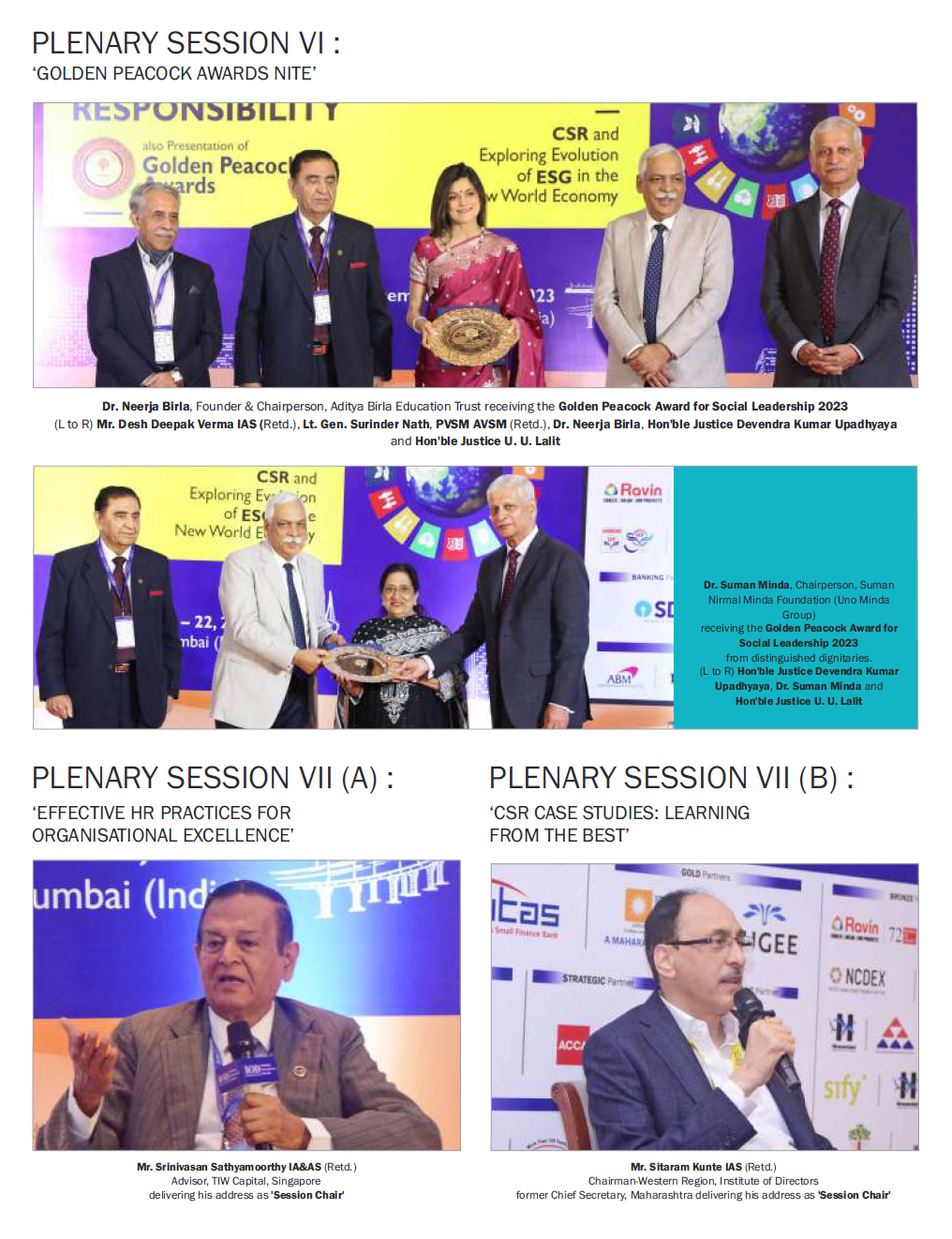
This was followed by an interactive Q&A Session with the Audience.
PLENARY SESSION V – Embedding ESG Goals into Business Strategy to bring a heightened impact on returns and shareholder participation
The 'Special Address' was delivered by:
Mr. Suhel Seth
Co-founder, Equus Redcell Advertising Company Limited
Managing Partner, Counselage India
The Session was Chaired by:
Mr. Aun Abdullah
Head – ESG, Lodha Group
The Session had the following eminent speakers:
(1.) Ms. Sireesha Chandana
Vice President - Learning & Development and Sustainability, The Indian Hotels Company Limited (IHCL)
(2.) Mr. Prasanna Karnik
Vice President – Operations, Sugee Group
Mr. Seth began by emphasising the role of organisations like IOD in helping boards realize the importance of being genuinely accountable to shareholders by first being accountable for their culture. He expressed the belief that charity is ingrained in our bloodstream and remains a duty of individuals to give back to society as much as they can. Giving back, he emphasized, cannot only be monetary; it must also be through actions and deeds, which is where Environmental, Social, and Governance (ESG) principles come in. He noted that today, consumers are becoming more responsible and responsive to companies that contribute positively to society. In the current global landscape, responsible corporate citizenship is gaining significance, and ESG is viewed not as a favour or responsibility but as 'dharma' and 'kartavya'. He highlighted a prevalent issue where independent directors of various companies often do not read enough about competition, competition, or consumers. He appreciated IOD's role in the increased understanding and awareness of the responsibilities of independent directors. Drawing from his experience, he asserted that nothing significant can happen in this world without partnership and teamwork.
Mr. Abdullah said that India was a bright spot in the global economy, contributing as much as 15% of global growth in 2023. He mentioned the "Amritkal period," during which India is expected to transition from a $2700 GDP per capita to a $15000 mid-income economy. This economic shift is anticipated to enable 10 crore households to become capable of homeownership, particularly in urban centres. Identifying key sustainable factors, he emphasized social mobility, climate security, and energy security. He referenced the World Economic Forum's global risk report, which indicates that climate risks will be a top concern for humanity in the next ten years. These risks impact assets and the entire value of ecosystems, making action on resilience crucial. He pointed out that policies, markets, sentiments, energy costs, and the overall energy ecosystem will play a significant role in transitioning towards a low-carbon economy. This shift is imperative for addressing climate risks and ensuring a sustainable future.
Ms. Chandana discussed how the current generation is more inclined towards purpose-led living rather than just focusing on the basic needs of "Roti, kapda and makan". She emphasized the importance of collaboration with external partners, as going alone may not lead to significant progress. The new generation is inclined towards running responsible businesses, and every business needs to consider how it can collaborate with various partners in different spaces to make a positive impact. She mentioned that the government has established a short, concise list of regulatory requirements, and Indian hotel chains have taken the lead in surpassing these requirements. She highlighted the increasing focus on how independent directors are driving the sustainability agenda, making it stronger and richer. There is a huge opportunity with the independent directors to drive the Sustainability agenda in a structured manner, especially with the regulations in place, and she predicted that there is much more to come in this regard.
Mr. Karnik expressed gratitude towards the government and policy makers who are adopting a comprehensive approach (360 degrees) in terms of preserving the environment while also facilitating businesses to sustain. He appreciated the beautiful blend of environmental preservation and development initiatives. Proudly, Mr. Karnik mentioned that their projects have been completed 100% on time in the redevelopment space, contributing to the creation of a better environment in the city. This highlights a commitment to timely and successful completion, ultimately enhancing the overall living conditions and surroundings.
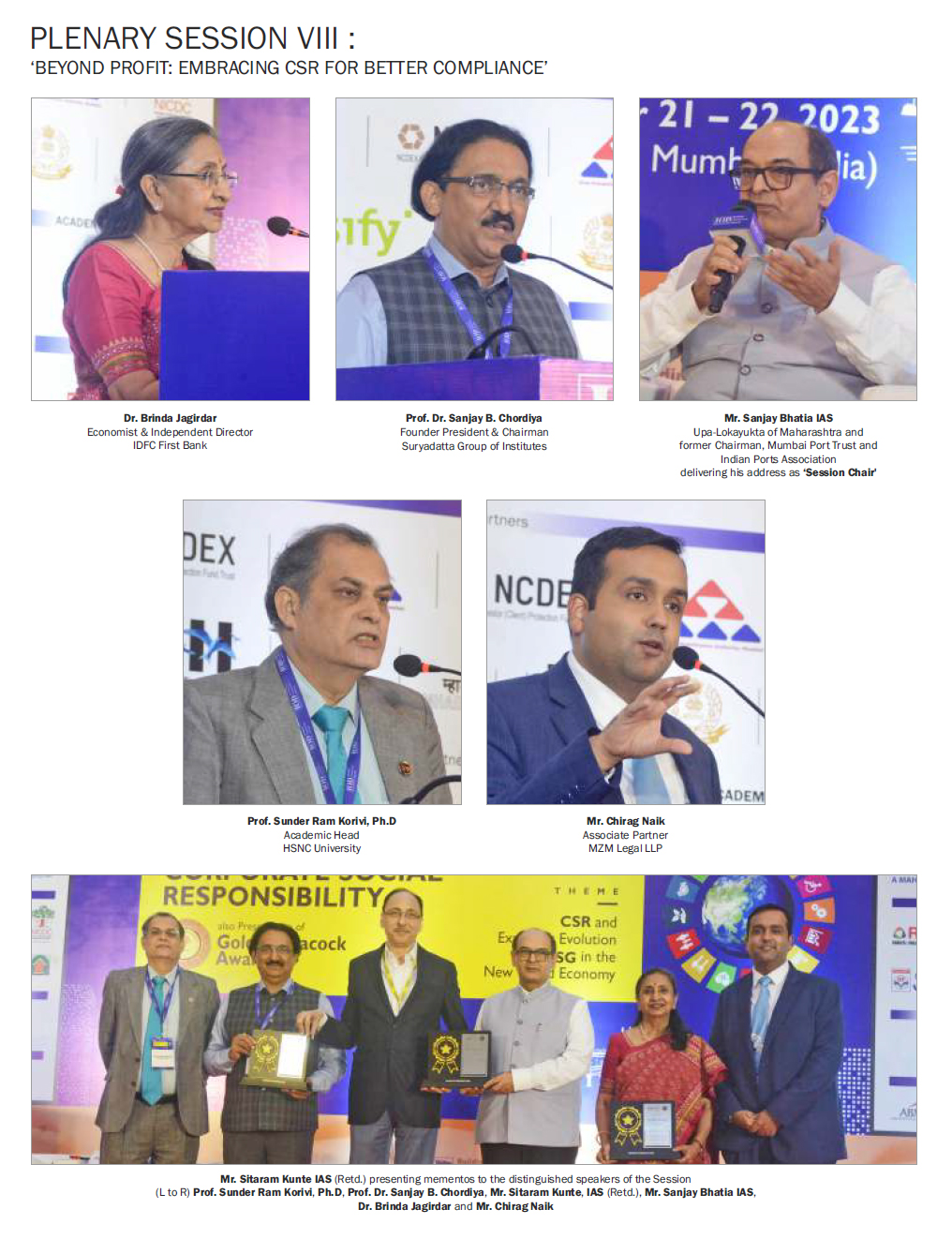
This was followed by an interactive Q&A Session with the Audience.
PLENARY SESSION VI - GOLDEN PEACOCK AWARDS NITE
To commence the 'Golden Peacock Awards Nite', the 'Introductory Speech' was delivered by:
Mr. Manoj K. Raut
CEO & Secretary-General - Institute of Directors
Mr. Raut acknowledged the significant milestone of IOD completing its 33 years of service. He expressed honour in addressing the transformative role played by IOD India in shaping the nation's economic landscape. In an era marked by challenges and rapid evolution, the influence of IOD extends beyond boardrooms and resonates in the corridors of economic growth and sustainability. He highlighted IOD's belief in the mantra of 'if no networking you are not working'. Currently, through the Golden Peacock Awards secretariat, IOD evaluates around 1000 leading organisations for various categories and supports many boards and directors in their efforts to improve government standards. He shared the delight of experiencing significant growth, with IOD welcoming around 150 new members every month. Acknowledging the critical need for collaboration and participation, he emphasized the importance of bringing young minds into boards to drive growth, considering the large youthful population of the country. He briefly introduced the Golden Peacock Awards and congratulated the winners in advance.
This was followed by the 'Welcome Address' delivered by:
Lt. Gen. Surinder Nath, PVSM AVSM (Retd.)
President, Institute of Directors
former Vice Chief of Army Staff and Chairman, UPSC & ID, L&T
Lt. Gen. Nath extended a warm welcome to the guests and eminent speakers attending the conference. He emphasized that the conference aims to facilitate networking among award winners and other business executives, fostering better and closer relationships for mutual benefit. He went on to explain the selection and assessment system for awards, highlighting that CSR award winners have started invested in other states, promoting a pan-India approach. He took the opportunity to congratulate the winners and expressed appreciation for all the participants.
This was followed by the 'Special Address' delivered by:
Mr. Sailesh, IAS
Member, Public Enterprises Selection Board (PESB)
former Secretary, Dept. of Public Enterprises
Ministry of Heavy Industries & Public Enterprises, Government of India
Mr. Sailesh emphasized that CSR is a fundamental compliance requirement for companies, reflecting their commitment to the people they serve and all stakeholders. He mentioned that this commitment goes beyond mere compliance and is driven by a voluntary desire to contribute positively to society. According to him, public sector has taken significant steps to introduce best practices and undertake reforms. The market capitalization and benchmark index have witnessed substantial growth, surpassing expectations in terms of market valuation. He expressed appreciation for both the public and private sectors for adopting best practices across various domains.
This was followed by the 'Guest of Honour Address' delivered by:
Hon'ble Justice U. U. Lalit
former Chief Justice of India
Hon'ble Justice Lalit proudly highlighted that industrial and economic activities in India are not treating CSR as a mere duty or responsibility but are striving to excel and take steps ahead for the betterment of society. The changes observed in this regard have also been influenced by judicial intervention. He emphasized the connection between the standard of living and the economic activities of a nation. He further noted that economic activities are synonymous with entrepreneurial excellence exhibited by technocrats, industries, companies, and the corporate sector. In the contemporary landscape, the pursuit of mere economic activity and profit-making is no longer seen as an ideal. Instead, there is a recognition that discharging social responsibility is equally crucial. This reflects a broader perspective on the role of businesses in contributing to the welfare of society beyond mere financial gains.
This was followed by the 'Guest of Honour Address' delivered by:
Hon'ble Justice Devendra Kumar Upadhyaya
Chief Justice - High Court of Bombay
Hon'ble Chief Justice Upadhyaya began by quoting Mahatma Gandhi: "If anyone of us is in doubt, then he must remember the weakest person whom he has seen and then evaluate if the step you contemplate is going to be of any use to him”. He added that the concept of CSR in today's business ecosystem has evolved into the single most important aspect of corporate and organisational identity. In the context of the growing focus on ESG and Sustainability, CSR has become an engine for organisational growth and sustainability. He acknowledged IOD as one of the most vocal organisations enabling policy initiatives that support the inception and growth of CSR. He noted that IOD is playing a crucial role in shaping agile and future-ready boardrooms for industries seeking new-era growth.
He emphasized the need for corporate entities to strike a balance between the economic and social aspects of business processes. Additionally, he highlighted how the Golden Peacock Awards has increasingly become a global benchmark for corporate excellence and have had a major impact on shaping industrial trends. This recognition reinforces the significance of CSR and sustainable practices in the corporate world.
This was followed by the Presentation of Golden Peacock Awards for Social Leadership–2023 to Dr. Neerja Birla, Founder & Chairperson, Aditya Birla Education Trust and Dr. Suman Minda, Chairperson, Suman Nirmal Minda Foundation (Uno Minda Group). This was followed by the Presentation of Golden Peacock Awards for Corporate Social Responsibility (both National and Global), 'HR Excellence' and 'Innovation Management' – 2023.
Mr. Desh Deepak Verma IAS (Retd.), Principal Advisor, Institute of Directors, proposed the 'Vote of Thanks'. He conveyed sincere thanks and gratitude to the Chief Guest, distinguished speakers, participants, partners, and supporters. Additionally, congratulations were extended to the IOD, Mumbai region for successfully organising the event in a short span of time. He also acknowledged and congratulated the winners of the Golden Peacock Awards.
DAY 2
PLENARY SESSION VII:
Concurrent Session (A) - Effective HR Practices for Organisational Excellence
The Session was Chaired by:
Mr. Srinivasan Sathyamoorthy IA & AS (Retd.)
Advisor - TIW Capital, Singapore
Mr. Sathyamoorthy discussed the impact of the COVID-19 pandemic on work dynamics, noting the transition to blended work, with some employees working from home and others attending the office. He highlighted the challenges of reversing this policy and the emergence of various intersections and interventions, both internal and external. He emphasized the need for HR policies to reflect the changing nature of the company, especially when its trajectory and business strategies transform. He then touched on what employees look for in a company, emphasizing that financial incentives alone are not sufficient. Employees seek challenges, recognition, opportunities for self-actualization, and a sense of belonging to an institution. Lastly, he discussed the guidelines for the presentation and requested that the presenters adhere to these guidelines.
Respective individual case studies in the 'HR Excellence' category were shared by the below mentioned companies:
1. Larsen and Toubro Limited
2. Adani Total Gas Limited
3. The Indian Hotels Company Limited
4. Nayara Energy Limited
Respective individual case studies in the 'Innovation Management' category were shared by the below mentioned companies:
1. Nuvoco Vistas Corp. Limited
2. Signify Innovations India Limited
3. Tata Steel Limited
4. Comviva Technologies Limited
Each presentation was followed by an Interactive Q&A Session with the Audience.
PLENARY SESSION VII:
Concurrent Session (B) – CSR Case Studies: Learning from the best
Success Stories of CSR Excellence
The 'Chair' of the Session was:
Mr. Sitaram Kunte IAS (Retd.)
Hon. Chairman – Western Region, Institute of Directors, India
Mr. Kunte extended a warm welcome to all the presenters, audience, etc. He said that the conference is an endeavour to learn from each other. He added that CSR has made a significant difference in the funding pattern in Maharashtra, and there is a prevailing need for companies to contribute to making life better in their local communities. He requested that the presenters adhere to the guidelines and showcase the initiatives they have taken in the realm of CSR. This indicates a commitment to sharing knowledge and experiences for the collective benefit of the community and society at large.
Respective individual case studies in the 'CSR Excellence' category were shared by the below mentioned companies:
1. Evalueserve Holdings AG, Switzerland
2. Tata Communications Limited
3. Reliance Industries Limited
4. Mahindra and Mahindra Limited
5. Coromandel International Limited
6. SBI Cards and Payment Services Limited
7. JM Financial Limited
8. GlaxoSmithKline Asia Private Limited
9. Tata AIG General Insurance Company Limited
10. Dr. Reddy's Laboratories Limited
11. Ericsson India Private Limited
12. Grasim Industries Limited
PLENARY SESSION VIII – Beyond Profit: Embracing CSR for better Compliance
The Session was Chaired by:
Mr. Sanjay Bhatia IAS
Upa-Lokayutka of Maharashtra
former Chairman, Mumbai Port Trust and Indian Ports Association
The Session had the following eminent Speakers:
(1.) Dr. Brinda Jagirdar
Economist & Independent Director - IDFC First Bank
(2.) Prof. Dr. Sanjay B. Chordiya
Founder President & Chairman - Suryadatta Group of Institutes
(3.) Prof. Sunder Ram Korivi Ph.D
Academic Head - HSNC University
(4.) Mr. Chirag Naik
Associate Partner - MZM Legal LLP
Mr. Bhatia elaborated on ESG, emphasizing that these factors determine the overall capabilities of the company. The first issue he discussed was the misconception that CSR is merely a philanthropic function and may not impact other areas of the company. He said "CSR is either done outside the purview of your stakeholders, or you are doing CSR for your stakeholders; in both cases, it affects your ESG ratings." He highlighted that aligning CSR activities with stakeholders' values can positively impact ESG ratings.
Dr. Jagirdar spoke about the nature and importance of CSR, and explained how CSR and ESG are embedded in India's culture. She said, “India gained momentum in 2013 with the introduction of the Companies Act 2013, which made CSR spending and reporting mandatory, making it one of the first countries in the world to impose a statutory obligation in this regard”. She highlighted that companies achieve success when their CSR activities align with India's development objectives, UN SDGs, and the vision and mission of the company. She also mentioned that strategic CSR involves designing the right CSR programs, finding suitable partners for execution, and implementing monitoring and evaluation mechanisms. She emphasized three key areas: finding purpose, adopting a strategic approach, and ensuring compliance to ethically create social good. This underscores the importance of aligning CSR efforts with a clear purpose, a strategic framework, and ethical practices for positive social impact. She highlighted the focus on wholesale and retail finance, specifically in funding socially responsible and environmental initiatives.
Dr. Chordiya said that CSR, or ESG, begins at one's home. He said, “As custodians and trustees, individuals are responsible for handing over all natural resources to the next generation.” According to him, CSR is a personal and social responsibility, not just a corporate social responsibility. Expressing his personal belief, he mentioned that the CSR topics discussed over the last ten years are not just contemporary, their need existed way before. He urged individuals to use available resources judiciously, recycle, reuse, and contribute to the betterment of society. He encouraged those who are medically fit, knowledgeable, experienced, and have the support of their families to serve as mentors in various fields, including public service, professional service, and nation-building efforts.
Prof. Korivi discussed the importance of looking beyond 'profit' and considering loss mitigation and prevention as crucial commercial principles. He expressed concern about the national loss incurred when individuals make the wrong career choices, emphasizing the need for career counselling services. He introduced the DEI framework, which stands for Diversity, Equity, and Inclusion. Diversity was discussed beyond physical, geographical, racial, and religious aspects, emphasizing diversity of thought. Equity was highlighted as giving access to education for all, and inclusion was stressed in the context of adapting to the changing educational landscape. He encouraged partnerships and collaboration with stakeholders, the use of technology to lower education costs, and adapting to a changing landscape.
Mr. Naik explored the changing landscape of CSR, particularly in the context of MSMEs. He highlighted the negative perception of CSR in India and the need for a mindset change. He discussed a German law called the "Act on Corporate Due Diligence Obligations in Supply Chains," which requires German companies to ensure Human Rights and environmental compliance throughout their supply chains. He emphasized that Indian MSMEs, which were previously only required to engage in CSR voluntarily or as mandated by Indian law, will now need to collaborate and implement CSR programmes to stay relevant in the global market. He stressed that compliance with global legal regimes is becoming crucial for Indian businesses aspiring to be global manufacturing and services hubs. He suggested MSMEs to proactively embrace CSR, not just due to legal mandates but as an existential exercise to stay relevant in the global market and contribute positively to social and environmental responsibilities.
This was followed by an interactive Q&A Session with the Audience.
This was followed by a 'Vote of Thanks' proposed by Mr. Sitaram Kunte IAS (Retd.) Chairman - Western Region, Institute of Directors. He expressed heartfelt gratitude for the success of the conference. He congratulated the IOD, Mumbai team and all the partners who helped. He thanked the panelists for their excellent insights into Corporate Social Responsibility and also congratulated the winners. He particularly thanked the Media Partner for covering the event. With the successful completion of this conference, he announced the upcoming UAE Global Convention in Abu Dhabi scheduled for March, 2024.
On behalf of IOD, he further thanked the Hotel Authorities of Hotel Taj Lands Ends for the excellent arrangements.
IOD is especially grateful to its Event Partners of the conference.
Platinum Partners:
(1.) Global Schools Foundation, Singapore
(2.) Equitas Small Finance Bank
(3.) Greenko Group
Gold Partners:
(1.) Sugee Group
(2.) REC Limited
(3.) Maharashtra Housing and Area Development Authority (MHADA)
Strategic Partner:
Association of Chartered Certified Accountants (ACCA), UK
Banking Partner: State Bank of India
Silver Partners:
(1.) Maharashtra State Power Generation Company Ltd. (MAHAGENCO)
(2.) Bharat Petroleum Corporation Limited (BPCL)
Bronze Partners:
1. Maharashtra State Police Housing & Welfare
Corporation Limited (MSPHC)
2. Hindustan Petroleum Corporation Limited
3. Ravin Group
4. Hiranandani Group
5. NCDEX
6. HSNC University
7. Sify Technologies
8. MZM Legal
9. Slum Rehabilitation Authority, Mumbai
10. National Industrial Corridor Development Corporation Limited
Associate Partners:
1. ABM Knowledgeware Limited
2. Haffkine Bio-Pharmaceutical Corporation Limited
3. Shriram Finance
4. Maharashtra Industrial Development Corporation (MIDC)
5. Systra India
Academic Partner: Suryadatta Group of Institutes
Media Partner: Republic TV
This report is compiled by:
Institute of Directors
Mumbai Region
&
Laghima Sharma
Assistant Executive Editor
A GLIMPSE OF AUDIENCE REPORT JANUARY
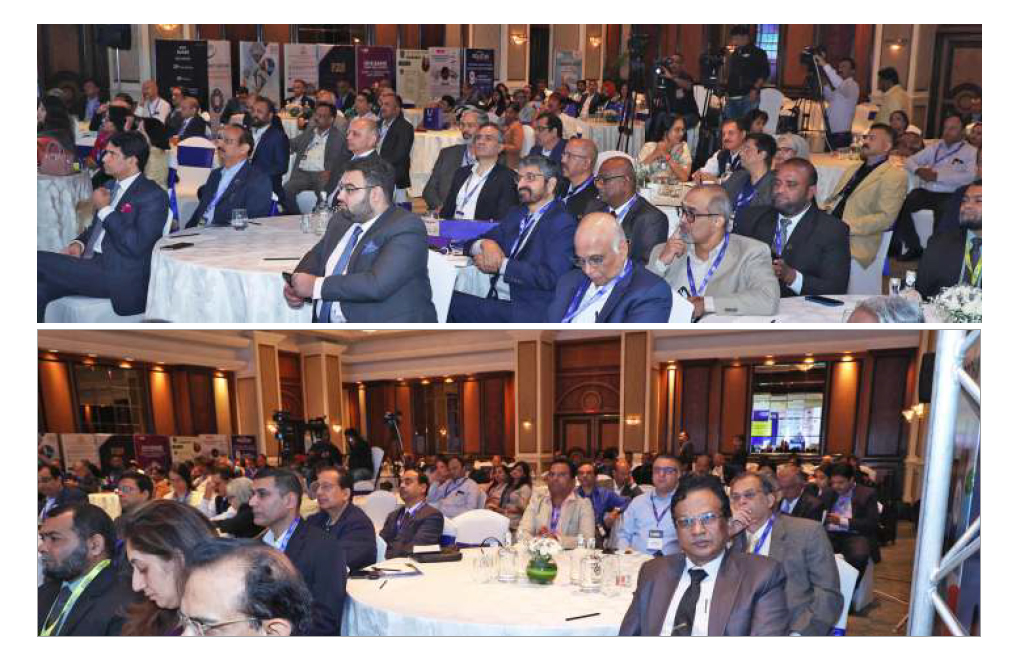
PARTNERS & SUPPORTERS
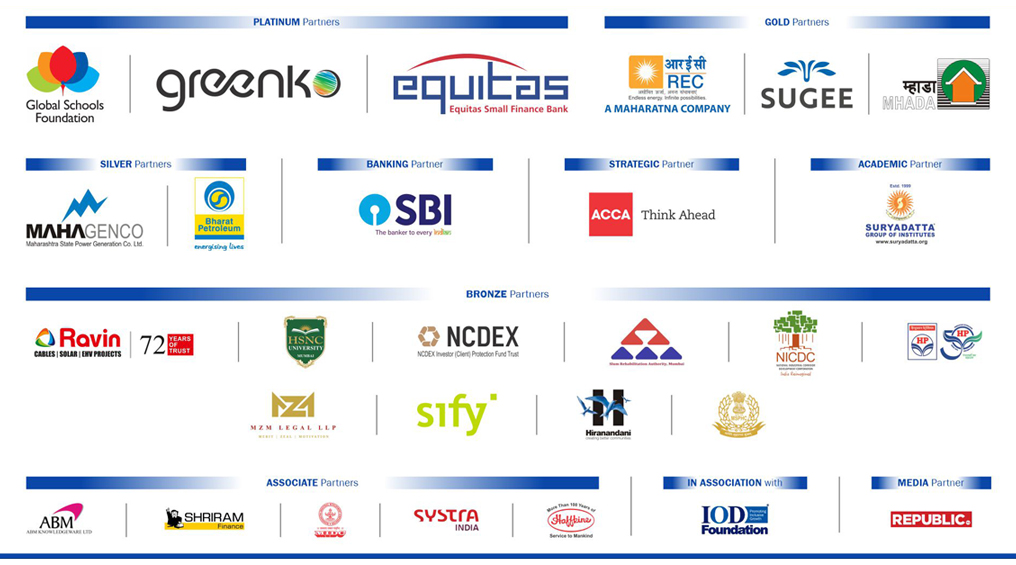
Author

Institute of Directors India
Bringing a Silent Revolution through the Boardroom
Institute of Directors (IOD) is an apex national association of Corporate Directors under the India's 'Societies Registration Act XXI of 1860'. Currently it is associated with over 31,000 senior executives from Govt, PSU and Private organizations of India and abroad.
Owned by: Institute of Directors, India
Disclaimer: The opinions expressed in the articles/ stories are the personal opinions of the author. IOD/ Editor is not responsible for the accuracy, completeness, suitability, or validity of any information in those articles. The information, facts or opinions expressed in the articles/ speeches do not reflect the views of IOD/ Editor and IOD/ Editor does not assume any responsibility or liability for the same.

 Quick Links
Quick Links
 Connect us
Connect us




 Back to Home
Back to Home

